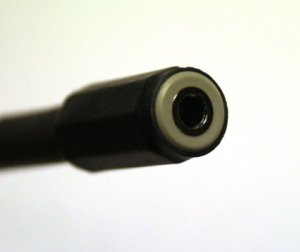A few days ago I got myself a total bargain in the form of Shure I2C-M headset (as in mobile phone headset with microphone) which I bought at Amazon for mere $19.99 (!)
I was impatiently waiting to get a hold of my new toy. I’m not going to review it here – one can find a plenty of information in the Inet. I just say that the headphones are good enough and are simply great for 20 bucks 🙂
The only ripple I’ve discovered so far is the fact that I can not use all the features of the headset with my laptop. The reason is that most of the moder computers are equipped with two separate jacks for headphones (out) and microphone (in). The jacks are 3.5mm 2-rings ones, like that below:
However, mobile phone headset jack is different and I’m not talking about the facts that they differ in size, shape, wiring schematics, etc. I’m talkig about particular 3.5mm headset jack which has 3 rings thus provides 4 contacts for headset, mic and ground. Something like this one:
Now, the question is to how to convert one to another? Well, if you good with soldering and have enough time to spare – you can sure and with ease produce an adapter to do the job.
I wanted quick and cheap solution, so I decided to search and find something standard and ready to go. After quite some some time spent on searches I found out two things:
- it was faster to solder one
- people are unaware about the fact that 3.5mm mobile headsets aren’t exclusive to iPhone. In fact there is vast number of better phones, using this type of connector.
Long story short, after some elaborated googling I’ve found this adapter or headphone/mic splitter cable, mistakenly called ‘iPhone headset adapter’.
Hopefully this little article will help someone to safe a bit of time, when in need to find such an adapter.
Fast forward two weeks
I have received the adapter in the mail. Here how it looks like:
 Overview Overview |
 Tail connectors for mic. and stereo out (marked) Tail connectors for mic. and stereo out (marked) |
|
 3.5mm jack 3.5mm jack |
The cable is clearly handmade, although very professionally and nicely. And the best part of the story that it DOES the job: I can use my new Shure I2C-M with my laptop to listen a music or to make VOIP calls! The quality is good and I can’t hear any artifacts neither in the audio nor in my recorder voice.
Conclusion: ordering the cable like this worth the time and money if you aren’t capable of soldering a couple of wires and some connectors. Otherwise, you might be much better off going to the local electronic store for some low cost components and making your own one!